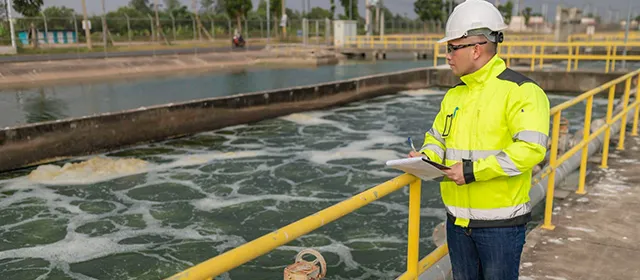Water loss in distribution systems is a serious global issue: on average, 16 percent of treated water in U.S. public systems is lost, and 75 percent of that is due to leaks. (Source: www.osti.gov)
In many water networks around the world, “unaccounted-for” water, caused by leaks, metering error, or theft, typically ranges from 20 to 30 percent of production.
A compelling real-world example comes from a city in Turkey, where installation of a SCADA system led to a drop in total water losses from 64 percent in 2014 to 32 percent by 2019.
These losses not only waste valuable resources but also drive up treatment and operational costs. Supervisory control and data acquisition (SCADA) systems help address this by giving utilities real-time visibility into their networks, enabling faster leak detection, remote control of pumps and valves, and better decision-making.
According to Kings Research, the global SCADA in water and wastewater management market is anticipated to hit $2.78 billion by 2030. In this blog post, we will explore the top 10 globally recognized companies operating in this industry.
Introduction to SCADA In Water and Wastewater Management Industry
SCADA (Supervisory Control and Data Acquisition) systems typically consist of a network of sensors, controllers, and human-machine interfaces that collect and analyze information about various aspects of water and wastewater treatment processes. These systems provide users with real-time data and control over equipment, processes, and operations.
The growth of the SCADA in water and wastewater management market is driven by initiatives focused on improving access to safe water and sanitation services, developing innovative and sustainable funding models, and promoting public-private partnerships. For instance, in 2024, the U.S. government announced nearly $6 billion for clean drinking water and wastewater infrastructure as part of the Investing in America tour. These investments aim to enhance public health and safety, support environmental sustainability, and stimulate economic growth through job creation.
The New York State Department of Environmental Conservation (DEC) and the New York City Department of Environmental Protection (DEP) announced a $3.5 billion agreement to further improve the health of New York Harbor and advance climate resilience.
Top 10 Companies Dominating SCADA In Water and Wastewater Management Market in 2026
Below is the list of the top 10 prominent companies in the sector, all of which have a strong global presence.
1. Ovarro
- Specialization in water infrastructure: Ovarro is very water-focused — they provide RTUs (remote telemetry units), SCADA systems, acoustic leak-detection loggers, and analytics tailored to water utilities.
- Enterprise SCADA (SCOPE): Their SCOPE SCADA platform is scalable and designed for real-time control and monitoring of water/wastewater networks.
- Cloud-native SCADA: They offer StreamWebscada, a web-enabled, cloud-based SCADA system for remote assets.
- Strong RTU hardware: Their Kingfisher RTUs are modular, reliable, and have been widely deployed (e.g., in New Zealand) for utilities to standardize across many sites.
- Sustainability and efficiency: Their SCADA systems help in leak detection, optimizing energy use, predictive maintenance, and regulatory compliance — all key for modern water operations.
- Cyber-secure architecture: Their SCOPE system is designed with security in mind, which is critical for water infrastructure.
- Strategic acquisitions: Ovarro has grown by acquiring companies like Datawatt (telemetry/SCADA expertise) and ControlPoint (data management), strengthening its vertical in water utility tech.
2. PSI Software SE
- Industrial software expertise: PSI provides software for optimizing complex processes in utilities and industries, including water.
- SCADA implementations for water utilities: PSI’s SCADA-based systems have been used in real water/wastewater companies — e.g., PSI Polska delivered a SCADA system to Aquanet S.A., a large Polish water/wastewater utility.
- Optimization focus: Beyond just SCADA, PSI’s strength lies in process and energy optimization, which helps water companies reduce energy costs and improve efficiency.
3. Eaton
- Cyber-security for SCADA: Through its MTL (part of Eaton) product line, Eaton offers SCADA-relevant cybersecurity gear (e.g., Tofino security appliances) to protect control networks in water and wastewater plants.
- Reliability and safety in critical infrastructure: Eaton’s solutions address both control reliability and safety, which is very important in water infrastructure where SCADA systems must be robust and secure.
4. Emerson Electric Co.
- Industrial automation leader: Emerson has deep experience in industrial control and process automation; they provide controllers, HMI/SCADA, and process control systems.
- Water-sector use cases: Emerson has a strong footprint in water treatment, leveraging its automation systems to help plants with reliable operations, energy savings, and process optimization.
- Software + hardware integration: Their SCADA offerings integrate well with their other control systems (PLCs, valves, instrumentation), making holistic automation possible.
5. General Electric (GE)
- Proven deployment: GE’s iFIX SCADA / Proficy suite has been used in large-scale water and wastewater facilities. For example, in Poland, a water utility replaced 4 separate SCADA systems with a unified enterprise SCADA (using GE’s iFIX, Proficy Historian, Webspace) reducing hardware cost and improving redundancy.
- Large, integrated systems: Their SCADA can handle very large tag counts: e.g., GE worked on a system with ~500,000 tags for a water reclamation plant in Singapore.
- Digital transformation: GE’s software portfolio (Proficy, Historian) helps water utilities move towards data-driven operations, with real-time data and long-term trends.
6. Hitachi, Ltd.
- Strong global footprint: Hitachi is a major player in industrial automation and infrastructure globally. Their SCADA/control solutions are often part of large-scale water infrastructure projects.
- Digital capabilities: They combine SCADA with IoT, data analytics and smart infrastructure solutions, making them relevant for modern water/wastewater systems that are increasingly digitized.
7. Honeywell International Inc.
- Integrated control + SCADA: Honeywell provides SCADA as part of its broader control systems (e.g., Experion PKS). For water/wastewater, they emphasize unified control with telemetry.
- IIoT readiness: Their ControlEdge PLC is IIoT-ready (supports OPC UA, has built-in cybersecurity), which makes SCADA data integration and remote monitoring easier.
- Experience in utilities: Honeywell’s legacy in control and process automation gives them credibility in water sector automation, especially for plants needing rigorous process control + data acquisition.
8. Rockwell Automation Inc.
- Strong SCADA portfolio: Rockwell offers SCADA through its FactoryTalk suite, and also integrates with its PLC and control hardware (Allen-Bradley). This gives water utilities a cohesive automation + SCADA ecosystem.
- Modern control systems: Their newer systems (e.g., PlantPAx) blend control and information, enabling real-time visibility, better scalability, and seamless integration with SCADA.
- Reliability and support: Rockwell’s global services, maintenance, and strong reputation in industrial automation make it a trusted choice for critical water infrastructure.
9. Yokogawa Ltd.
- Deep expertise in process control: Yokogawa is well known for its process automation systems, measurement, control, and information technologies.
- Open, scalable SCADA/control: Their automation systems are designed for flexibility, reliability, and scalability, important for water plants of different sizes.
- Global water projects: They have a track record in large-scale water/wastewater plants, leveraging their control systems + SCADA to improve performance, safety, and efficiency.
10. ABB
- Comprehensive water automation: ABB provides automation and SCADA solutions tailored to the entire water cycle, from water treatment to distribution and wastewater.
- Open, scalable architecture: Their SCADA systems are built on open architectures, allowing integration across different systems and future growth.
- Value-added applications: ABB’s SCADA is not just for monitoring; they build in energy management, predictive maintenance, and optimization apps that help water utilities reduce costs and improve operational efficiency.
End Note
SCADA systems are a powerful tool for water and wastewater utilities looking to become more efficient and resilient. By delivering real-time data, automated control, and early alarms, SCADA helps reduce water losses, improve service reliability, and cut operating costs. Its full potential is realized when integrated with modern sensing infrastructure and leak-detection technologies. As utilities face aging pipes, growing demand, and stricter environmental regulations, SCADA is becoming essential for building smarter and more sustainable water systems.



